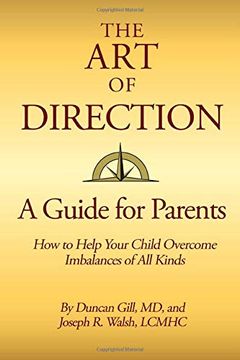The art of Direction: A Guide for Parents: How to Help Your Child Overcome Imbalances of all Kinds (in English)
Synopsis "The art of Direction: A Guide for Parents: How to Help Your Child Overcome Imbalances of all Kinds (in English)"
The mental health system in the United States is fragmented, underfunded, and underdeveloped. And, to put it bluntly, it’s hard to find good help these days.Drawing upon their twelve years working together at an intensive outpatient program with over 3000 families, Dr. Gill and Mr. Walsh offer the reader their unique perspective on helping children overcome their imbalances to become healthy, independent adults. The approach that they have developed over the years has proven as effective as it is unconventional.This book is a comprehensive guide for parents trying to help their children navigate the trials and tribulations of their teenage years. Its scope is broad, covering problems big and small, behavioral and biological. It provides a primer to the subject of psychiatry and medication use in young people, as well as to Wholeistic Education (WED), Mr. Walsh’s own therapeutic approach that has helped thousands of families achieve harmony at home. Parents come every day to Dr. Gill and Mr. Walsh with all kinds of questions about their children. Some examples include:•Is there really a problem, or is this normal behavior at this age? •Does my child need to see a therapist? •Does my child need to see a psychiatrist? Does he need medication? •Does my child need to be hospitalized? •My spouse and I are on totally different pages as to how to deal with this problem—what can we do about that? •Am I being too hard on my child? Too easy? •Our child won’t go to school—how do we handle that? •Our child won’t talk to us / her therapist / her psychiatrist. Now what? •Different doctors keep giving our child different diagnoses. What’s the deal here? In this book, the authors help parents find answers to these questions and others like them. They arm parents with the information they need to tackle the wide variety of challenges they may face in child-rearing, whether or not they ultimately decide to seek help from professionals. Along the way, they dispel a myriad of myths related to mental health treatment—myths often unrecognized and perpetuated by practitioners themselves. The scope of this book is broad. It is written for parents who are struggling with their children’s use of social media, refusal to empty the dishwasher, or resistance to attending school. It is written for parents of children who talk of suicide, sneak out at night, or use drugs. It is written for parents of children who have bipolar disorder, autistic spectrum disorder, or schizophrenia. It’s written for parents who feel like they can’t tell which way is “up” anymore. It is divided into three sections. The first provides an introduction to the authors and an overview of the different types of imbalances that can cause problems for young people. The second section offers an introduction to psychiatry, so-called “biological imbalances” like depression and bipolar disorder, and their treatment. The third offers an introduction to WED, a treatment approach developed by Mr. Walsh for addressing “developmental imbalances” and behavioral problems. WED provides a way to understand the principles of good parenting and therapy, and also serves as a practical model that can be implemented in any family, clinical, or other group setting. Being a kid is hard, and being a parent is arguably harder. Whether you find yourself arguing with your child about a cell phone, or trying to help a child with a serious mood disorder, this book can help.

